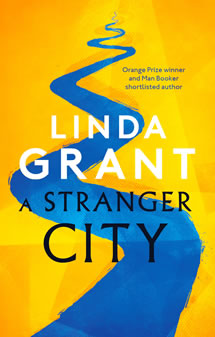Reviewed by Robert Goodman.
By Linda Grant, Virago, $32.99.
 There are so many novels about London. A massive, diverse city, much like New York it provides endless fodder for novelists. It is also the perfect crucible for exploring broader changes in both Britain and the world. John Lanchester’s Capital explored London and Londoners and the response to the global financial crisis. Books like Monica Ali’s Brick Lane and Timothy Mo’s Sour Sweet looked at London from the perspective of newcomers to the city. Linda Grant’s new novel A Stranger City uses London to explore a number of themes, most particularly the Brexit vote and its impact.
There are so many novels about London. A massive, diverse city, much like New York it provides endless fodder for novelists. It is also the perfect crucible for exploring broader changes in both Britain and the world. John Lanchester’s Capital explored London and Londoners and the response to the global financial crisis. Books like Monica Ali’s Brick Lane and Timothy Mo’s Sour Sweet looked at London from the perspective of newcomers to the city. Linda Grant’s new novel A Stranger City uses London to explore a number of themes, most particularly the Brexit vote and its impact.
The book opens at a funeral. The body is of an unidentified woman found dead in the Thames after jumping off one of the bridges. Pete, the police detective working on the case, is one of the only ones there, as is a team of documentary makers led by Alan. They hope that by making a documentary they can find someone who can identify the woman. Jump back seven months earlier to the night the woman dies and Chrissie, a young Irish nurse, has a fight with her flatmate on the tube and storms off. Due to various encounters and the loss of her phone, she does not emerge for a few days, by which time she has become a social media star. She is not the dead woman but they may well have crossed paths that night. These are just a few of the characters that Grant checks in with as her view roams around London and the English countryside in the ensuing years.
But her main character here is often London itself, ‘inflamed and hectic’:
… Shard, Gherkin, Oxo Tower, a panorama part-obscured by the towering arms of crimson cranes, crawling prehistoric creatures of the twenty-first-century riverbank. A new block of flats was going up, it ascended in front of the Shard’s base. By autumn their flat would have lost the view. In the foreground the thousand streets, the low brick terraces, beneath them old farms and market gardens, remains of cottages, bridle paths, drovers’ roads, manor houses, wolf tracks in the snow. It was impossible, Alan thought, to tell London’s story … the place simply defied narration.
And later:
Autumn and winter are the natural conditions of England. London is a city made for rain and traffic-clogged roads, umbrellas at the bus stop shaken out on the tube platform, a metropolis of scarves and parkas and boots and bottle-green leather gloves lined with cashmere which Francesca buys every year, the complete pair never surviving until spring.
Although starting in 2016, Grant subtly and without fanfare slips into the day after tomorrow. She moves through the euphoria of Brexit among the elderly and the staunchly national to look at what happens next to immigrants and foreigners. Before long there are trains carrying refugees:
… the filthy engines spattered with mud coming down from the north-east. The carriage windows were blacked out, desperate fingers scratched away at the paint. Terrible things were done … random raids, possessions uncoupled from their owners, children separated accidentally from their parents and assigned to complete strangers in clumsy tidying-up of the mess they had made. Rows of human monitors along the tracks held up placards of protest and solidarity.
Grant, clear-eyed, chronicles the impacts of this creeping racism dressed up as nationalism and its consequences. From a clearly non-white family being made to feel unwelcome at a “British” café in the Lake District; to he way in which the multicultural nature of Alan’s small London community drains away when the owners of the Greek deli leave and the German family move back to Germany after a scare. ; to a horrific random attack on a character who is London to his toes but looks foreign.
A Stranger City is a quietly angry book. It takes London with its rich multicultural traditions and imagines that fabric being slowly torn apart by the poisonous xenophobia that underlay the Brexit result. Grant is not completely pessimistic. She still has some faith in London and Londoners and their capacity for goodness. But that faith is strained, and the strain shows in those characters she allows to show concern for the changes in their city and their country.
This review first appeared in Newtown Review of Books.
This and over 400 other book reviews can be found on Pile by the Bed.











